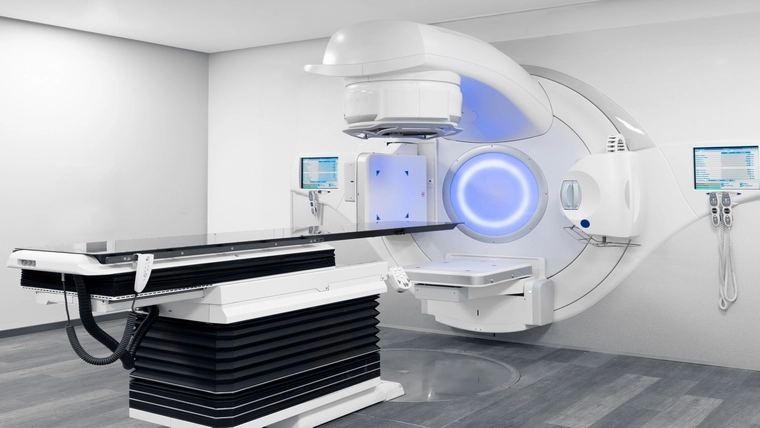
What is Radiation Oncology? What Diseases Does It Treat?
Radiation oncology is a medical specialty that uses radiation to treat cancer. In this field, high-energy rays are used to target and destroy cancer cells. Radiation oncology is generally used to shrink cancerous tissue, treat tumors, or prevent them from spreading. Radiation oncology plays an active role in the treatment of many types of cancer, especially breast cancer, lung cancer, prostate cancer, and head and neck cancer.
About the Department of Radiation Oncology
The radiation oncology department is the unit that performs and monitors radiotherapy applications in cancer treatment. In this department, patient treatment plans are prepared, treatment is applied using radiotherapy devices and patients are closely monitored during the sessions. The radiation oncology department adopts a multidisciplinary approach and works in collaboration with oncology, surgery and other medical fields.
Who is a Radiotherapy Specialist and What Are Their Duties?
A radiotherapist is a doctor who specializes in the use of radiation in cancer treatment. Their duties include assessing patients' suitability for radiotherapy, preparing treatment plans, administering radiotherapy, and monitoring patients' general health during treatment. Post-treatment follow-up and managing possible side effects of radiotherapy are also among the radiotherapist's responsibilities.
How Does Radiotherapy Affect the Body?
Radiotherapy damages the DNA of cancer cells, preventing them from dividing and multiplying. High-energy beams are directed at the cancerous area and destroy the cancer cells. Radiotherapy usually causes minimal damage to healthy cells in the treated area, but some side effects may occur.
What Diseases Does Radiotherapy Treat?
Radiotherapy is a widely used method, especially in the treatment of cancer, but it can also be used in the treatment of some benign diseases.
The main diseases treated by radiotherapy are:- Breast Cancer: Radiotherapy is used to treat breast cancer to reduce the risk of tumor recurrence after surgery. Radiotherapy administered after lumpectomy (partial breast removal) or mastectomy (full breast removal) targets any remaining cancer cells.
- Prostate Cancer: In the treatment of prostate cancer, radiation therapy is often used as an alternative or additional treatment to surgery. It can also be used to relieve pain in advanced prostate cancer.
- Lung Cancer: Radiotherapy is used in the treatment of lung cancer both to shrink tumors in the early stages and to keep the disease under control in advanced stages. It can also be applied as an additional treatment before or after surgery.
- Head and Neck Cancers: Radiotherapy is often used to destroy tumor residues after surgery for tumors in the head and neck region. This treatment method can be applied alone or in combination with other treatments, depending on the location and size of the tumor.
- Brain Tumors: Radiotherapy plays an important role in the treatment of both malignant and benign brain tumors. It can be used to destroy tumor cells that cannot be removed by surgery or that remain after surgery.
- Gynecological Cancers: Radiotherapy can be used before or after surgery in the treatment of uterine, cervical and ovarian cancers. It is also preferred to prevent the spread of these cancers or to relieve symptoms in advanced cases.
- Rectal Cancer: In the treatment of rectal cancer, radiation therapy may be used before surgery to shrink the tumor or after surgery to destroy any remaining cancer cells.
- Skin Cancer: Radiation therapy may be used as an alternative to surgery in the treatment of basal cell and squamous cell skin cancers, especially when surgery is not possible.
- Lymphoma: Radiation therapy is used to treat Hodgkin's and non-Hodgkin's lymphoma, targeting specific areas of disease and shrinking tumors in the lymph nodes.
- Bone Metastases: If cancer has spread to the bones, radiotherapy is used to relieve pain and preserve bone health.
Radiotherapy is an important method used in the treatment of these diseases and is often combined with other treatment methods (such as surgery, chemotherapy, immunotherapy) as part of a multidisciplinary approach. The patient's condition, the type and spread of the tumor are the determining factors in radiotherapy planning.
What are the Types of Radiotherapy?
Radiotherapy can be applied using different techniques and these techniques are chosen according to the patient’s condition and treatment needs. The main types of radiotherapy include external radiotherapy, brachytherapy (internal radiotherapy), hyperfractional radiotherapy and intraoperative radiotherapy. Each technique offers different advantages depending on the area treated and the type of tumor.
What is External Radiotherapy?
External radiotherapy is a treatment method that directs high-energy beams from outside the body to the cancerous area. During treatment, the patient is held in a certain position under a radiotherapy device and the beams are applied to the exact targeted area. External radiotherapy is one of the most commonly used types of radiotherapy.
What is Hyperfractional Radiotherapy?
Hyperfractional radiotherapy is a radiotherapy method in which daily doses are divided into smaller doses and administered more frequently. This method optimizes the destruction of tumor cells while preserving healthy tissue. It is usually used to treat aggressive tumors.
What is Intraoperative Radiotherapy?
Intraoperative radiotherapy is a type of radiotherapy applied directly to the tumor bed during surgery. This method is applied immediately after the tumor is removed and aims to destroy any remaining cancer cells. Intraoperative radiotherapy is a preferred method, especially in advanced cancers.
What Happens During a Radiotherapy Session?
Before the radiotherapy session, the patient's treatment plan is reviewed and the area to be treated is positioned appropriately. During the session, the patient remains motionless under the radiotherapy device for a certain period of time. Radiotherapy is usually short-term and is completed within a few minutes. After the session, the patient's condition is monitored and an evaluation is made for the next treatment.
Are There Any Side Effects of Radiotherapy?
Although radiotherapy is usually a targeted treatment, some side effects can occur. These side effects vary depending on the area treated, the doses used, and the general health of the patient. Common side effects include skin redness, fatigue, pain in the treated area, and hair loss. Side effects are usually temporary and resolve after treatment.


